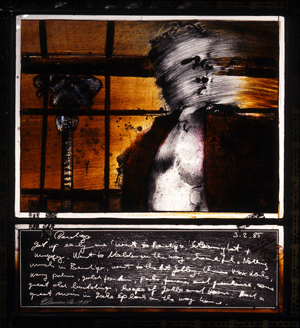Fused: Gerhard Emmerichs
Fused: a journey from artists in the National Art Glass Collection

- Gerhard Emmerichs Pictures of a diary No. 5 1985, painted, stained, leaded antique glass, steel frame
Cultural Background
My family goes back a few centuries in the area I was born
Place of Origin
Kamp-Lintfort, Lower Rhine Region (near Dutch Border), NRW, Germany. I lived & worked in the region until disembarkation
Start of Migration Journey
Frankfurt, Germany – International Airport, 14 February 1981
Place of Arrival in Australia
Tullamarine Airport, Melbourne –16 February 1981
First Home in Australia
Elsternwick, Melbourne
First job in Australia
Tutor for glass painting at Chisholm Institute of Technology (now Monash University)
Other Jobs in Australia
Always worked freelance, self employed
Any glass related objects that you brought with you? And still have?
A number of glazing tools and glass painting brushes
Gerhard's Story
I was born in the Kamp-Lintfort, Lower Rhine Region, NRW, Germany; my family would go back for centuries in that area.
From 1974 – 1978 I did my glass painting apprenticeship and journeyman's years at a large family owned studio called Hein Derix, Papal Court Glass Painters in Kevelaer, FRG. In 1980 I completed my Masters Certificate in glass painting and glass decoration techniques at Staaliche GlassFachschule, Hadamar, FRG.
I learned to make the traditional detailed and intricate stained glass windows, in contrast to leadlight, which in Australia you would see a lot in Victorian buildings. Painted glass has not been extensively used since the turn of the century in architecture. Apart from my own work I have done many restorations on old Victorian glass in Australia, and in Europe I have worked on medieval glass.
While I was at Hadamar I met Klaus Zimmer who was doing a short course to learn some techniques. He had been teaching in the ceramics department at Caulfield Institute of Technology (now part of Monash University) in Melbourne, which included the glass department and was employed to run the glass workshop. Klaus could see that after six years with a highly reputable company such as Hein Derix and my Masters Certificate I would be a valuable person to help set up the glass studio at Caulfield. He invited me to come out to Australia and assisted me with the whole process of getting here and also made it possible for me to start teaching shortly after I arrived. At the same time I did my Bachelor of Fine Art and started teaching part time, which I continued for about nine years.
When I finished my course in 1984 I set up my own studio along with my Australian wife Bern who is a ceramic artist, we lived in South Melbourne and I took on commissions also working on exhibition pieces and continuing my teaching. From about 1986 - 1989 Bern & I were part of a collective artists' workshop called "Whitehall Enterprises" which included other artists like Mark Douglass, Karl Millard, Eddy Parritt, Leanne Tregear and Darryl Cowie. We shared facilities in a toxic old Footscray factory and regularly collaborated on architectural commissions and arty interior fit outs, we also regularly exhibited together. Our range of techniques included forged steel and other metals, architectural ceramics, hot, warm and cold glass, concrete and wood. When the lease ran out and the site got redeveloped, it was time to return to individual studios.
Then in 1990 we moved to Yandoit near Daylesford in central Victoria and bought a beautiful sandstone property built in the 1850s, we had the children and set up our studios: it was at that time I stopped teaching. After about nine years we moved back to inner city Melbourne in Windsor where we currently live and have our studios.
In 1999 we went back to Germany to live for about three years. Although we had gone back on many visits we decided to take our two daughters over for a longer period of time. The kids went to primary school and kindergarten over there. Bern and I had a number of commissions and exhibitions together in Europe; one was in Majorca Spain and another at a museum located in an ancient abbey in my home town.
Like many Europeans I always had an interest and romantic ideas about Australia as this country across the other side of the world. Growing up in Europe, which is fairly cramped and overpopulated, you think of Australia as the "last frontier" with endless opportunities and enormous spaces, very much the opposite from what I knew.
Australia is a comfortable place to live with relative freedom, and one very positive thing is the multiculturalism that gives you a feeling of not being alone as a migrant.